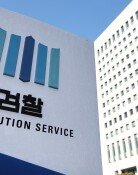Time for Kim Young-ran to get out of Kim Young-ran Act
Time for Kim Young-ran to get out of Kim Young-ran Act
Posted March. 11, 2015 07:22,
Kim Young-ran, former chairwoman of the Anti-Corruption and Civil Rights Commission (ACRC), talked about the Anti-Corruption and Conflicts of Interest Act, nicknamed as "Kim Young-ran Act," which recently passed the National Assembly. Passage of this bill in the Assembly itself is like a miracle, said Kim, welcoming the successful legislation of the act designed to eradicate corruption among public officials. However, the former commission chairwoman pointed out that the act has become a "half-baked one" after being modified to serve for interests of lawmakers.
The provision to prevent conflicts of interest, which was the gist of original bill proposed by the commission, aims to ban typical corruptive acts where a public officials position conflicts with personal interest, such as a ministers hiring his unqualified children to the ministry or a public organization heads giving construction orders to his relatives company as a special favor. Omission of the entire provision is problematic. Unlike the original draft, the act defines lawmakers delivery of the third partys civil complaints as an exception for illegal solicitation, which requires for revision since it can lead to generating "brokers at the legislature."
Kim told a press conference on Tuesday, I dont want this act to be called "Kim Young-ran Act. Even though it is a nickname coined by the press, Kim might have affection over this law named after her name. Kims comment such as It is too early to talk about revision or amendment before implementation, emphasizing "implementation of the act," might come from her affection. However, her opinion is just one of many personal opinions since the act has passed the parliament. In the mist of rushing interview requests, Kim gathered reporters and gave her opinion at the venue of press conference. But it is not appropriate for a former ACRC chairwoman to come forward instead of the incumbent chairman. As a person who originally proposed the bill, Kim needs to step back, and wait and see the enforcement decree that the commission will polish, discussion in the Assembly and review the result delivered from the Constitutional Court.
Regarding the acts inclusion of journalists and private school personnel, Kim said, I dont believe it is unconstitutional. Given the survey result where 69.8 percent of the public positively viewed, it is hard to see the law is an excessive legislation or violates the principle of proportion. Considering that one of the Constitutional Courts important roles is to check laws in the nature of populism, public survey results that may change according to trend cannot be proper grounds to judge unconstitutionality of a law. The Korean Bar Association has filed a constitutional petition citing that the act violates the principle of equality in the Constitution and has high probability to damage the freedom of press. The Seoul Bar Association has demanded President Park Geun-hye to exercise a veto against the act.
Last year, the public chose "deep-rooted corruption" as the biggest problem in our society in the "public opinion survey on the national transformation" conducted by the Dong-A Ilbo after the Sewol ferry disaster. Pursuit of personal interest by taking advantage of public office is the corruption. To eradicate the rampant corruption, it is necessary to weed out unconstitutional and excessive factors from the Kim Young-ran Act and go back to the original intention to get rid of corruption among public officials that Kim had sought. During the grace period of one and a half years, in-depth discussions are required for this purpose.



![“한동훈, 정치생명 걸고 무소속 출마해 평가받는 것 고려할만”[정치를 부탁해]](https://dimg.donga.com/c/138/175/90/1/wps/NEWS/IMAGE/2026/01/19/133186982.1.jpg)


![[한규섭 칼럼]왜 여당 지지율은 떨어지지 않는가](https://dimg.donga.com/c/138/175/90/1/wps/NEWS/IMAGE/2026/01/19/133189257.1.png)
